studyblr network for GCSE and A-Level students. Tracking #heyukstudying
Don't wanna be here? Send us removal request.
Text
Help for my dad’s funeral costs
Hello!
As some of you may know, my dad recently passed away and the funeral costs are an unexpcted and hefty expense. If you can spare anything I’d be incredibly grateful, but if not, sharing is just as appreciated
Thank you!
The gofundme page can be found here
153 notes
·
View notes
Note
hi! i’m moving to England soon, and i have to choose four subjects for my A levels. By now i’ve had 17 subjects in school, so this is quite hard for me. I want to study something economics or business related at uni, and i think i’ll take Economics, Maths and Psychology for my A levels. I’m not sure about the fourth subject. I don’t know whether to choose Politics or Geography. I might want to study Art as well, but I don’t think it’s as important for business as these two other subjects. What do you recommend? And what combination of subjects do studnets usually take when they want to get into business? pls answer as soon as possible
Hi!
Picking A-levels can be difficult! I don't know much about business/economics so I would recommend looking at university courses that you like the look of. On their websites they should have course specific requirements. As long as you take any A-levels that they specify then you should be good. I doubt they will specify all 4 so for the others I would recommend taking the subjects you enjoy the most!
Hope this helps,
Emily :)
4 notes
·
View notes
Note
I lowkey really regret the alevels I chose but it’s too far into the year to change them. I love maths but doing basically three maths intensive alevels really beats the motivation out of me. Quarantine made that so much worse too. Sorry this isn’t a question I just needed to get that off my chest
This is one of the hardest things to deal with and you have my sympathy! You need to ask yourself why you are regretting your choices.
Is it because you simply don't enjoy it? If this is the case ask yourself why this is? You must have some interest in the subject so maybe it is the modules you are studying. If this is the reason then maybe do some reading around the subject to rekindle your interest.
However, if the reason is because you find the content too hard then I would recommend asking your teacher for help. If you feel you cannot ask this teacher then approach one on that subject area that you feel you can. At the end of the day it is your qualification and so find someone who you understand- friends or study groups can also help here.
Another reason why you no longer like the choices is perhaps because you have decided you no longer want to do the career choice you set out to do and so the A levels you chose are no longer relevant. If this is the case I would go and speak to your careers advisor as I'm sure they have dealt with these problems before and they may be able to help.
I hope this was helpful in some way and good luck!
Emily :)
3 notes
·
View notes
Note
do you think english lit, history and philosophy is a good a level choice combination??? im stuck between choosing philosophy, politics or psychology
Hey there, I think any of those three subjects would compliment English Lit and History well, so choose based on the one you think you would enjoy the most! Psychology has much shorter essays than the others and is more science based, whereas politics and philosophy both have much longer essays.
I always recommend starting on four if you can and dropping the one you like least after a few weeks, especially if you’re stuck between subjects like you are :)
- Polly @studeres
6 notes
·
View notes
Note
hii!! thanks for keeping this blog active, it's so much of a lifesaver since idk how uk exams work and it's particularly puzzling because i didn't take any gcse's. my chosen subjects for AS are currently chemistry, maths, economics and psychology. however recently ive been considering replacing psych with biology. ive heard that they are pretty similar but what would your advice be when choosing between the two? thanks in advance!
Hi,
This may be a bit late now and I apologise for that!
Although Biology and Psych can be similar as you study a few similar topics, they are by no means the same. At A-level I believe in Psychology you focus a lot on different case studies and theories around a specific topic as well as learning about the how a psychological experiment should be carried out. Biology is tough more like the other sciences. Yes there are still theories but to me there tends to be more certainty as to the correct or accepted theory. Also biology, I think, is more to do with understanding the content, not just memorising it, as you have to apply the knowledge to the exam questions you get given. My teacher use to tell us that only 10% was direct recall, 10% maths and 80% was application of knowledge. Another thing you need to consider is what you want to do later on. This is because psychology is not always considered a science to some universities and if you need more than one science then bio may be a good option. However, if you don’t or have no idea, then it it down to what you think you will enjoy more.
You can go and talk to your teachers and ask them more in-depth questions about the content and how it is taught in order to help you decide.
Good luck!
Emily :)
4 notes
·
View notes
Note
I love flashcards and i used them throughout my GCSE's and it really helped but i made some for my mocks that are coming up in May for my a-levels and i'm really struggling to put it in my head! please help
Hi,
Sorry for the late responses
A-levels are a lot harder as the material is more difficult and the volume of content to learn is much larger- so sometimes you need to change or adapt your study techniques.
In order to keep focused during my revision, I decided to play what I call ‘revision trivial pursuit’ This is where you replace the question cards of the board game with your own flashcards. By doing this with a friend you can become competitive and it forces you to remember more things in order to win and also makes it more fun.By doing do this, it also allows you to focus on more than one subject at a time so you don't get bored of studying the same thing. In fact doing any form of revision with a friend can make the process easier.
This may not work for you but I would encourage you to have a few different study methods so that you don't get completely bored of the one you already have. Maybe do a different method per topic and see which works the best, or maybe different subjects require different methods.
A-levels are hard and I wish luck and hope you get where you want to be. But must importantly, don't forget to have fun!
Emily :)
5 notes
·
View notes
Text
help a gal save for uni
Hey guys! As some of you may know, I’m in the process of applying for university, and I’m desperately trying to save up some money before I actually go!
I’ve set up a fiverr account, that can be found here if you’d like to check it out, and any shares/reblogs would mean the world.
I’m not a professional artist by any means, however I don’t think my prices are too steep and I’ll paint literally anyone or any facial feature.
36 notes
·
View notes
Photo
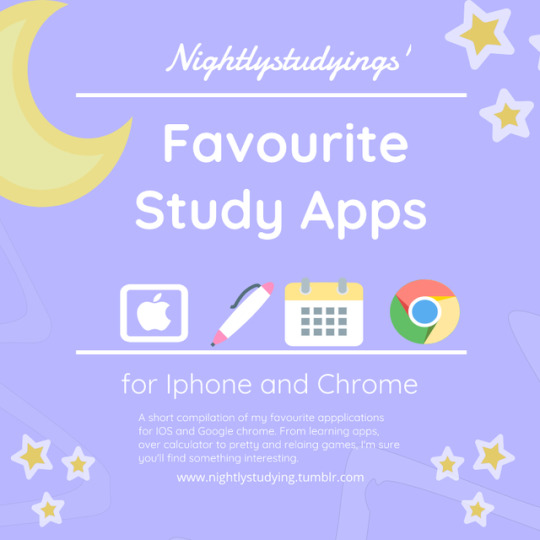
PART ONE - IPHONE
part two here
So this is my first post that isn’t a stupid text post or overly bright photo of my stationary, so I hope you’ll like it! It will consist of two parts, one for the ios apps and one for google chrome extensions. Feel free to send me recommendations!
bolded = favourite, cursive = apps I use every day
Note taking and co
Pocket - very useful app to save websites, articles, posts etc and read them offline.
Keynote, Pages, Numbers - basics if you have an apple device. I actually like keynote better than powerpoint c:
Notability - Very popular app and it really is worth its money. Great for note taking, especially in class!
Evernote - On my phone for over 4 years now. The group feature is so great and I use it for preparing posts
Werdsmith - very clean and minimalistic app for writing, I use it mainly for creative writing.
Microsoft One Note - Simple app for note taking and making online notebooks.
Languages
Leo - a great dictionary in 8 languages. If you log in you can save problem words and make vocabulary lists.
Memrise - My favourite app to learn languages for free. I’m learning Japanese with it!
Duolingo learning languages for free is always fun and duolingo is so easy to use, it’s even more fun! I use it to practice my Spanish.
Studying
Forest - Who doesn’t know and love forest yet? It’s such a cute application and I use it when I have a long study day/night ahead.
Brainscape - My to go app for flashcards. It has a giant library and it’s easy to make your own. Honestly, I’ve been using it for 3 years now and I still love it.
Mindly - A very beautiful app to make mind maps. I use it for story ideas and school work.
MindNode - also an easy way to make mind maps.
Uberchord - learn how to play the guitar for free c:
TheSimpleClub - videos, and tutorials of all important school subjects, mainly in German, I think
Notenapp - keep track of your grades - German
Khan Academy - like the simple club but with a broader spectrum and in English.
Tide - promodoro app with nice background sounds & inspirational quotes
Swifty - learn how to code in a very fun and simple way!
Flow timer - another great promodoro timer (they are everywhere). I like the minimalistic look and nice colours.
Inspiration & Motivation
Vantage - Simple but beautiful designed calendar
Calm - Helps me calm down with breathing exercises backgrounds and sounds.
Elevate - games and exercises that help to keep your mind fit
Pacifica - an app that helps with anxiety and mental disorders with a very kind community
TED Inspiring, interesting and motivating videos on a wide variety of topics.
Others
Textgrabber & Scanner Pro - Essentials. Scans photos and grabs texts of pdf and other documents and converts them into word/text documents.
Sleeptown - From the makers of forest a very cute app that helps you keep a healthy sleep schedule. I try to use it but I forget it often, sadly.
Tydlig - not free but honestly the best calculator you can have on your phone! Beautiful and simple it makes math so much more fun!
Spark - organizes your emails (even from multiple accounts) and notifies you if something important comes in. Very neat design.
Moon - cute app that shows the phases of the moon depending on the date.
Plant Nanny - keep track of your water intake by watering cute plants (they have something similar for walking and keeping track of expenses!)
17K notes
·
View notes
Text
How I organize papers
Quite a few people have asked me how I organize my literature reading, so here’s a walkthrough of how I do it. This is a method that works for me right now, and I’ve been consistent with doing it this way since I started reading more seriously for my oral qualifying exam.
Paper reading set up:
Printed copy at 85% (for space to write in the margin)
Black pen (for summaries, writing things in my own words, writing things to keep in mind, etc.)
Blue pen (for notes on experiment ideas, how these experiments/findings are relevant to what we study, things to take notes of, things to look up, etc.)
Yellow highlighter for general highlighting
No phone/computer/tablet
Cup of tea/coffee

I used to read on my iPad using Notability. I liked that option because it gives me more colors to work with, but I was also getting too distracted with what colors to use, all the apps on my iPad, and such. These are dry academic papers with a lot to process, and it’s really hard to compete with apps like FB and Reddit with their endless scrolls and easy to understand posts. I find that with my current set up of having just the bare necessity and no distraction means I’m more likely to read my paper and stay reading. Photo above was taken when I was summarizing, so I had both my phone and my laptop and took 2x as long to summarize…
Digital organization set up:
There is a “Paper” section within my OneNote lab notebook
Under this section, each tab has its own topic
Sometimes there are overlaps (interneuron deficit leading to Tourette) would have a main section in Tourette, and that just gets copy/pasted to the Interneuron with a note saying, “duplicate from Tourette”
In each tab has a “Table of Content,” which is a summary table of all the papers I’ve read on that topic
ToC is subdivided into several categories: paper, summary & conclusions, *something specific to this section, and notes & additional questions
Paper: contains title, *first author’s last name* et al., ### (*PI’s last name*)
Summary & Conclusions: things I’ve written in black or highlighted from the paper
*Specific to this section*: I don’t really know how to describe this section besides giving examples. For my Tourette tab, this section is Area Implicated since we’re interested in the regions of the brain associated with Tourette. For my protein of interest (PoI) tab, this section is PoI’s Condition since I want to distinguish the effect seen with heterozygous KO, homozygous KO, conditional KO, and point mutations, to piece out the function of the various domains
Notes & Additional Questions: everything I wrote in blue will go here. This section makes notes of the experiments I came up with while I read, lists questions I have during reading that can guide further reading, etc

This serves as a summary of all the papers I’ve read with enough information to know the paper without having to reread it. In my experience, it’s immensely helpful as I write my qualifying proposal. Having everything about one topic in one place allows me to quickly compare and contrast the different papers and see what has or hasn’t been done before and how to possibly fill the knowledge gap.
Physical organization set up:
My implementation of @cancerbiophd‘s method:
I currently have 1-1.5 inch binders containing 2-3 topics per binder
Each topic is distinguished from the other in the same binder via color coding tags
Each tag is labeled with *first author’s last name* et al., ### (*PI’s last name*)
Papers are stored in plastic sheet protectors to protect all parts of notes from hole punching, and this plastic sheet protector is flagged with the label above
The order of the paper is not really organized. Right now I have it by the order I read it in, but if I come up with a better way of sorting papers, I will adopt that instead


These photos are a bit outdated. I’ve switched my CELSR3/Tourette/Interneuron papers into the 1.5 binder since my research focuses on this particular area, and there’s a lot of papers that I’m reading that pertains to these topics.
Usage
When writing, I have the “table of content” side by side and read through that for a quick summary. If further info is needed, I can go through physical copy for more information, and since it’s organized in a way that makes sense to me, I can find it easily instead of leafing through all of my papers, some with very similar titles and authors.
Hopefully this is helpful to you! If you have any suggestions on how to make this process more efficient or comments on how you personally keep track of your literature reading, please let me know!
1K notes
·
View notes
Text

How to study when you don’t want to
I think I have a pretty good amount of knowledge about studying when you don’t want to because studying is not my favorite task
1) quizlet is your new bff
Download the quizlet app on your phone. Make or find a quizlet set for what you’re learning and go through the flash cards when you have some downtime and then play the little games so you’re learning while having a little bit of fun. I know my friends and I really love using quizlet and we made a class that anyone can add to so we have a mix everything and we like playing the games to see who can get a higher score so maybe get a few friends to do that with you
2) summary paragraphs are also your new bff
After you have a class of notes write a small paragraph summarizing all of the main points so you can read it quickly when you have time and don’t feel like pulling everything out to study. This is probably my favorite way of studying when I don’t want to because it’s quick and easy and good for learning material fast if you miss something.
3) flash cards
Make some flash cards with review questions on one side then a general answer on the other side. Go through the cards and put the ones you can’t answer or are having trouble with in a different pile then only go over those until you know them then go through the whole stack again the next day and see if you know more than you did. I like doing this one but sometimes it’s not the most enjoyable so take the cards with you to school and ask a friend if they want to study with you and quiz each other. We do this a lot at my school in my psychology class because we usually have some free time in there and we all quiz each other right before marine science so it’s fresh in our heads.
4) go outside/change location
Sometimes we don’t want to study because we feel stressed so go outside or to a more open place and just read your notes for a few minutes. Even a few minutes of studying is better than nothing.
5) search “*topic* song” on YouTube
I know it’s a little weird but when I missed a day of plate tectonics in science we were moving really fast and I didn’t have the best grasp on plate boundaries so I went to YouTube and found a song that was kinda cheesy but it helped me learn it and I ended up singing the song in my head during the test.
—Thats all I really have for now but I plan on making a part two if y’all want me to. I really hoped this helped but I know these won’t work for everyone and if anyone wants any more help or tips let me know and I’ll help to the best of my ability and if anyone has any post requests just let me know and I’ll try to do it. Feel free to add on in the comments or by rebloging.
1K notes
·
View notes
Text

I’ve noticed quite a few people have problems with this subject, so here’s a little guide to help you manage chem!!
1) Realise that it’s an understanding based subject: Most of the people I’ve talked to think chemistry is just learning, but it’s really not. Everything is happening because of something and once you understand your basics, your brain will automatically start making links.
2) Know your basics: As I mentioned above, knowing your basics is the most important thing. If you don’t have a clear base of how things work then you won’t be able to understand properly & will just end up learning.
3) STOP LEARNING REACTIONS: Reactions aren’t learning based either!!! There’s a simple rule for each reaction and if you apply that and balance it, you’ll get the required reaction. (Base + Acid -> Water + Neutral Salt). Of course there can be exceptions to this rule.
4) Become good at nomenclature: Nomenclature is a pretty big part of chemistry and it’s not that hard! Know the rules of nomenclature and practice hard until you get the names of your compounds right everytime.
5) Use mnemonics! Ok I’m not going to lie, there’s very little chances you’re gonna research and spend lots of time to understand why which elements are there in the earths crust, so make a mnemonic so it helps you! (Mine is Oh Shit Allowance fees can near kill my hungry tiara = oxygen silicon aluminium iron cacium sodium potassium magnesium hudrogen titanium)
711 notes
·
View notes
Text
How I am studying for A levels
So over the past two years, my study methods have changed a lot. During my GCSEs, I would just make notes for the most part and then put quotes onto flashcards. These methods didn't really help me retain much of the information but I didn’t know what else to do. My methods of revision have changed from just writing everything down to step by step condensing all the information I have.
1. Read through the textbook
Collect all the information I need from the book. Usually, I’ll have sticky notes nearby and just shorten down the paragraphs or even chapters in the book. 2. Make a knowledge organizer or mindmap if that suits you more
Take the headings from notes after reading and then condense the information from the sticky notes in my textbook. It means I have all the key information so that I can remember key points that aren’t mixed into these long sentences 3. Place quotes onto flashcards
This makes it easier to go through them and test myself. For my philosophy and ethics exam, I have to include quotes to back up my arguments so going through my flashcards I can try to memorize as many as possible. I tend to write more than I need to because that way I’ll remember at least 3-4 quotes for each topic. 4. Take knowledge from the organizer and condense that into questions on flashcards
Another way to condense information and then to train myself to see certain words and remember what they mean or know the associated words with them. It’s basically quizzing yourself repeatedly until you can remember how to answer them. I also like to have some essay questions and plans that I can try to memorize in case they come up in the exam.
5. Test myself with practice tests
This is the best way to actually put what you know into practice. For some of the exams, there are only a certain amount of things they can actually question you about so I tend to write all the questions I can think of down and slowly go through and answer them or at least create an essay plan. It means that when I get to the exam I have basically written out what I want to say so it’s only a matter of if I can remember what I wrote.
Anyway, this is just a brief overview of the methods that I’m using to revise. Hopefully, this might help someone shape their revision into a method of condensing information further and further until it is easier to understand :D
504 notes
·
View notes
Text
College Note-Taking System
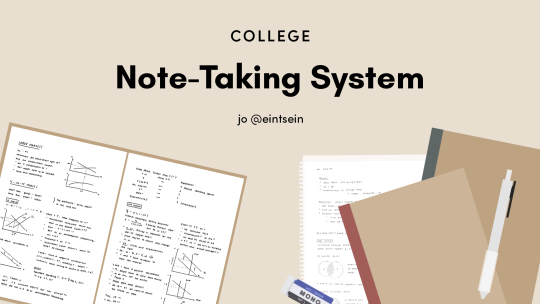
Having cohesive and effective notes is one of the key skills I think one should have, especially in an academic setting. When you’re receiving a ton of information each day, you want to be able to keep track of that and remember what you’ve learned. I’m constantly trying out ways to make my note-taking more effective and tailored to my needs. Here’s what my note-taking system looks like so far.
Quick note: click on the images for better quality!
Class Notes
Taking notes in class is an invaluable way to keep track of the new knowledge you’ve gained. However, depending on the mode in which the lecture material is conveyed, I take my notes differently. Here’s a summary of how I take my notes for each type of lecture, as well as some examples from the classes I’m taking now.
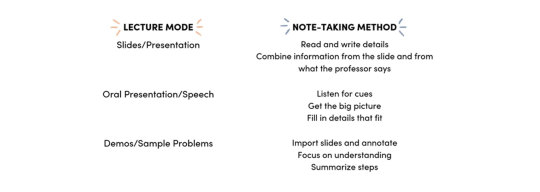
Slides (e.g. Macroeconomics)
Macroeconomics is a class in which you should be able to intuitively understand a lot of concepts but also remember a lot of things. Because of this, I’ve tailored my note-taking method and habits to achieve that goal.
I write my notes by hand because handwriting is more effective in committing things to memory.
As for what I actually do - and this is what I’ve done for other classes in which the professor/lecturer uses slides:
Read/skim over the slide.
Read each bullet point as the professor goes through them.
Copy it down if it’s straightforward or write it down in a structure and diction that I understand better (not necessarily in my own words - sometimes it’s just restructuring, e.g. splitting things up or joining different bullet points together).
Take note of any other important details the professor says about any particular point unless I think it’s intuitive or common sense.
Here’s an example from a Macroeconomics lecture.
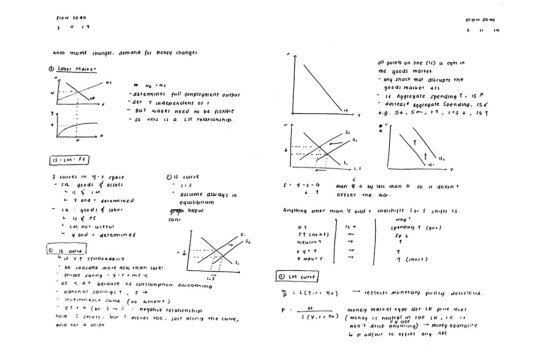
Oral Presentation (e.g. Anthropology)
During classes in which the professor just speaks and doesn’t use much visual material, I listen before I write instead of attempting to write down every single detail mentioned.
Also, I type up my notes instead of handwriting them since the exams are all open-book so I don’t really have to commit things to memory.
Here’s what I do:
Listen for a cue that tells you what this particular part of the lecture will be about (and write it as a heading).
Write down main ideas and their supporting facts/details. If the facts/details come before the main ideas, then I’d usually draw an arrow.
Write down ideas and details from readings in their own section/subsection.
Sometimes, my professor also shows short clips in class, in which case I’d write down the message that I think the clip was meant to convey, as well as things that the professor points out that I didn’t think of on my own.
I’d also look up concepts/ideas/people/events (in real time) that are important to my understanding of the lecture material.
Here’s an example of a Google Docs document from an Anthropology lecture.

Demonstrations and Sample Problems (e.g. Computer Science)
Classes in which the lecture is mainly going through demos and problems are kind of tricky, because you want to know and understand what the professor is doing, but you also don’t want to be writing down every single step that’s being executed. Here’s what I’ve found to be the most effective so far:
If there are any, I import the slides/handout onto OneNote and annotate directly on the slide. If not, I just write down things like definitions, important concepts, and syntax-related things.
I focus on understanding what the professor’s doing with the demo or problem.
I then summarize the steps they took and
Write down comments and points they brought up, e.g. common errors, desirable habits/practices.
Also, these kinds of classes are usually classes in which you’d learn better when you actually do problems yourself, so I definitely learn more when I do assignments and labs than when I’m in class.
Here’s an example from a Web Programming lecture.
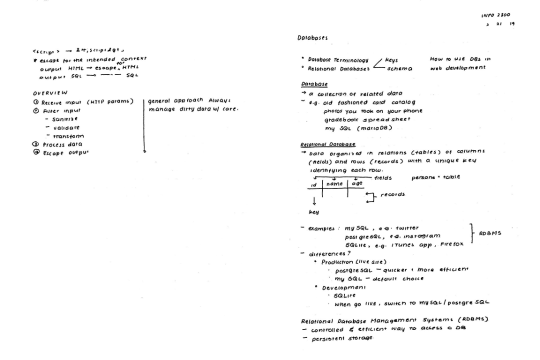
Here’s one from an Object Oriented Programming and Data Structures class. I often draw things to help me visualize the general points.
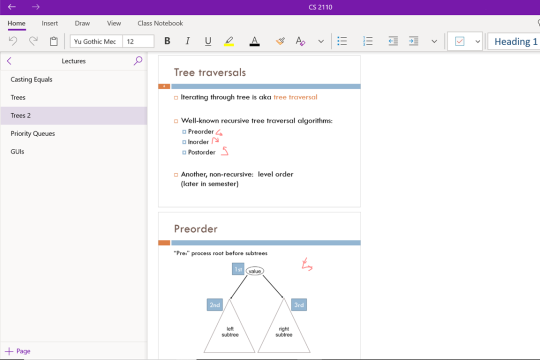
Rewritten Notes
My rewritten notes have definitely changed a lot since high school. Since most of my classes don’t require a lot of memorization, I organize my notes in such a way that they’d be easy to index or find information from. Here are some of the ways I do that:
Establishing a Visual Hierarchy
Having a well-defined hierarchy helps me flow through my notes really well as i read them. It helps me organize information like a mind map without actually making a mind map - I know the big topics and their subtopics and sub-subtopics and details … basically it’s easier to see how these ideas fit together.
But why don’t I just make mind-maps? See, the thing is, a lot of my notes require sequential or linear thinking, e.g. in macroeconomics it might be the sequence of events following a change in the economy, or in computer science it might be a general algorithm for solving a certain type of problem, or it might be proving or deriving a certain equation. These sorts of things just generally don’t work well with mind maps. Instead, establishing a visual hierarchy in my notes helps me organize different ideas while retaining the linear nature of the information.
Here’s what the hierarchy looks like.
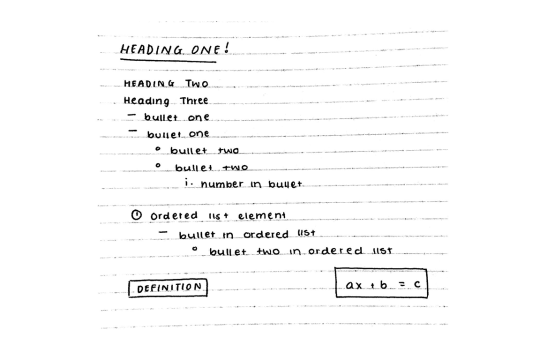
Here is an example from my Web Programming class, which is a purely project-based class, so no prelims or exams. As you can see, I draw rectangles around important terminology so that I can easily find them while I’m working on a project. I also include examples from in-class activities as well as notes on syntax so I have an idea of how to implement certain things. These examples and notes are further grouped by terminology/concept.
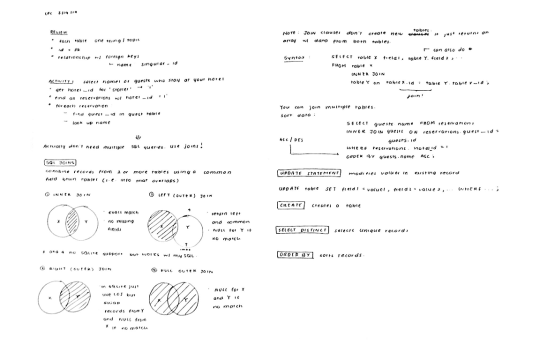
Structuring Them for Easier Flow
My syllabi for my college courses are nowhere near as detailed as the syllabi for my high school courses - those of you who take/have taken Cambridge exams would know. In college, my syllabi are only lists of topics and not what you’re expected to know for each topic. Because of this, I have to find a way to arrange information so that I can achieve the most comprehensive and cohesive understanding of that topic, i.e. so that the flow of my notes is similar to the flow of my thinking.
For example, in my economics notebook, I like to have the details first (e.g. the separate markets: the goods market, the assets market, and the labor market) and then the big picture later (IS-LM-FE). Some people prefer the other way around - seeing the big picture and then going into the details - which I can understand and have done myself for certain topics.
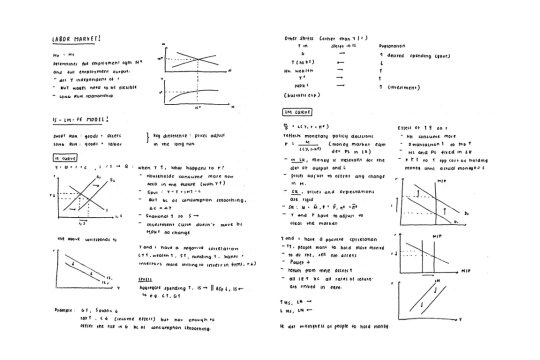
Making Use of Proximity and Spacing
I very much dislike notes without good use of spacing and grouping things together. Keeping related ideas in visual proximity helps your brain (or at least mine) organize this information. It’s also a lot easier to find things and visualize your notes when they’re not just a huge chunk of text.
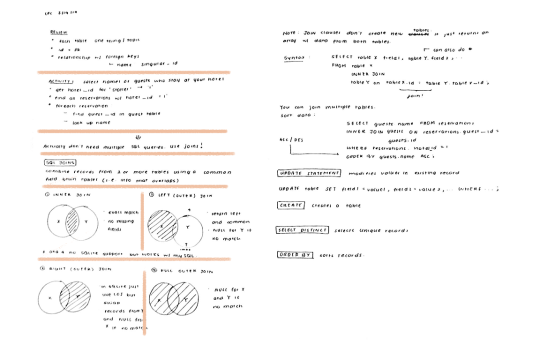
One thing I should probably mention is that I don’t use colored pens anymore because it just takes a lot of time to switch pens and think of a color palette. I also don’t have much use for it. In the past, I used color to help me memorize and group things in different categories, but now, I’ve found that there aren’t a whole lot of categories I need to keep track of, and when I do, I can do so with just one pen but changing the style of the text.
And that’s what my note-taking system currently looks like. It’s working well so far, but I still think there are other things I could try out that might be a better fit.
So yeah, hope this was helpful, and as always, feel free to drop an ask if you have any questions, or even if you have any suggestions or would like to share your note-taking system. Have an awesome week!
10K notes
·
View notes
Note
Hey! I’m doing a levels next year and I can’t pick (and no I don’t know what to do with my future, but something creative/art based) For sure I am taking art and I may take 3/4 a levels So I can’t choose between: Biology Sociology or phycology Geography
Hi, those subjects all overlap a little so the best way to look at it would probably be the style of learning/examination, as well as how you apply the content you learn.
I know that biology has very little essay writing but very specific markschemes (it is the only one of those subjects I do) so if you're looking for something quite technical I would suggest that.
Psychology has a bit on the biology of the brain but otherwise covers A LOT of studies and research methods etc. There are some medium length questions in exams for this so have a look at some papers if you might be interested.
Sociology is far more essay based than any of the others and relies on knowledge of a lot of case studies and real world knowledge. Definitely reccommend if you liked english lit at GCSE but can't say much more than that other than to have a look at the modules online.
I have no clue about geography at a level other than it covers both human and physical geography to some degree and has questions a similar length to psychology. This is also very case study heavy but you use them in a different way to the others.
I will say however, if there's any chance of you wanting to do a career in science, choose biology as there is often a requirement of at least one science a level and that is the only one of your choices which would count. All of your other choices are great for creative careers and would be good choices.
Remember that you can start off doing 4 and drop to 3 if you only manage to eliminate one option, and you can often swap in the first couple of months at college!
- Polly, @studeres x
11 notes
·
View notes
Note
Hi! Any advice for studying a different language? 🙂
Here are a few things that might help:
things to remember when learning a language
how to learn foreign languages
10 tips for studying a language
tips and tricks for learning a language
how to study languages in four easy steps
language learning: tips and resources
how to learn a new language
language learning masterpost
different ways to learn a language
I also made two language-specific printable packs which you can download for free which might be helpful! Xx
598 notes
·
View notes




